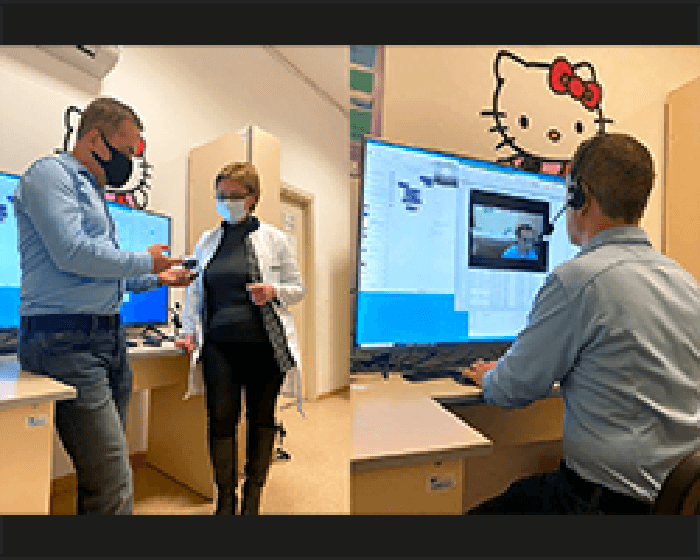“There was a crisis of information flow between the system and the patients at home,” says Dr Davit Mrelashvili, a neurologist from Georgia, referring to the pressure on his country’s health-care system when COVID-19 took hold. “As the country’s hospitals filled up, it was hard for stay-at-home patients to get timely, expert advice, and the 911 emergency system clogged up for those who truly needed it.”
Based in the United States of America, Dr Mrelashvili decided to return to his home country to try to address the problem and replicate some of the teleworking solutions that he had seen successfully employed in the United States.
He created virtual clinics that could accommodate as many patients as necessary without absorbing hours of doctors’ time. The initiative, named Project Atlas, links up 1 senior doctor, voluntary medical specialists, 2 junior doctors, medical students and patients in a series of virtual, cloud-based chat rooms.
“Individual patients can contact a doctor via their smartphone for tailored medical feedback, while general, protocol-based advice can be uploaded by medical students operating the system,” explains Dr Mrelashvili. “Before, doctors had to make phone calls, write notes and repeat the same basic messages to each patient individually. Now, the doctor’s time is freed up to respond to the most urgent requests.”
This is an example of the European Programme of Work 2020–2025 in action through one of its flagship initiatives, Empowerment through Digital Health. It shows how digital health can accelerate and improve the quality of and access to health services, making them more responsive to people’s needs.
Creating a task-force hierarchy
Project Atlas began with just 10–14 medical personnel, including medical students who were enlisted via a callout on social media. Working together, each clinic could carry around 1500 patients, reports Dr Mrelashvili, and by the end of December 2020, over 5000 COVID-19 patients had been “seen” by doctors.
With the support of Georgia’s National Centre for Disease Control (NCDC), the project received a list of new COVID-19 patients every morning, who were then contacted by medical students and invited to join a virtual room. The small minority of patients without smartphones were contacted with traditional calls and still placed in one of the virtual rooms with a doctor.
“We have created a task-force hierarchy, where it is medical students and junior doctors who obtain case histories and complete initial patient screenings, and senior doctors, while screening and monitoring all of them, respond in depth to the most critical cases that need urgent interventions,” explains Dr Mrelashvili.
If a doctor posts a voice message on the forum to say that a patient needs further monitoring, or to be transported to a hospital, the system operators arrange for a pulse oximeter to be delivered to the patient’s door or for an ambulance to collect them.
At the same time, all the messages to patients and protocol-based communication by junior personnel are monitored and quality-controlled by the licensed senior doctor who oversees all the rooms. That, however, takes exponentially less time than the same tasks being done by the senior doctor him or herself, who represents the scarcest resource in the pandemic.
Teleporting into the emergency room
Dr Mrelashvili explains that one of the benefits of Project Atlas is that it can be scaled up very rapidly, even at the unprecedented level needed to respond to COVID-19. It can also provide a platform to train the next generation of doctors, who learn from observing the recommendations and decisions made by leading physicians.
Project Atlas began with a virtual clinic in Georgia’s Kakheti region, and hopes to expand to other regions of the country with support from local governments and the NCDC. Voluntary specialists from all over the country in areas such as cardiology, pulmonology and paediatrics have been dropping into the clinics whenever needed to give their professional opinions.
“As doctors, we can teleport into different emergency rooms and make a decision in 30 seconds using this system,” reports Dr Mrelashvili, “so, why go and visit a doctor in person?” He hopes that the initiative will carry on in the future to optimize and improve health care and medical education in Georgia and elsewhere in the world.






